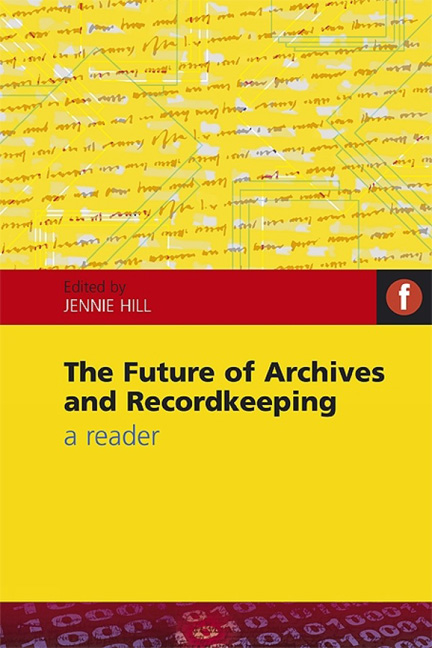Book contents
- Frontmatter
- Dedication
- Contents
- Acknowledgements
- Contributors
- Introduction: seeing the future of archives and recordkeeping
- Part 1 Defining archives
- Part 2 Shaping a discipline
- Part 3 Archive 20: archives in society
- Part 4 Archives in the information age: is there still a role for the archivist?
- 9 The postcustodial archive
- 10 Information management, records management, knowledge management: the place of archives in a digital age
- 11 Appraisal and the future of archives in the digital era
- Index
- Miscellaneous Endmatter
- Miscellaneous Endmatter
- Miscellaneous Endmatter
10 - Information management, records management, knowledge management: the place of archives in a digital age
from Part 4 - Archives in the information age: is there still a role for the archivist?
Published online by Cambridge University Press: 08 June 2018
- Frontmatter
- Dedication
- Contents
- Acknowledgements
- Contributors
- Introduction: seeing the future of archives and recordkeeping
- Part 1 Defining archives
- Part 2 Shaping a discipline
- Part 3 Archive 20: archives in society
- Part 4 Archives in the information age: is there still a role for the archivist?
- 9 The postcustodial archive
- 10 Information management, records management, knowledge management: the place of archives in a digital age
- 11 Appraisal and the future of archives in the digital era
- Index
- Miscellaneous Endmatter
- Miscellaneous Endmatter
- Miscellaneous Endmatter
Summary
Introduction: Professional challenges in the digital era
The ‘digital age’ is upon us, the ‘information society’ flourishes undisturbed: with the advent of at least one personal computer in most offices and homes, information is now consumed and produced en masse and primarily electronically. The call for high-speed internet connection as a utility rather than just a commodity is only the latest sign of how far the internet has penetrated every sphere of public and private life (DCMS, 2009). Many are now online at all times, go shopping on eBay and Amazon, buy groceries via Ocado, meet friends on Facebook and talk to colleagues all over the world via Twitter – and most of all leave a trail of data in the digital world that goes widely unnoticed, unmanaged and unwanted. Lynne Brindley (2009), head of the British Library, calls it ‘personal digital disorder’ and claims that we are in danger of creating a ‘black hole’. The idea of losing parts of our collective memory through technological obsolescence and inadequate digital preservation mechanisms has worried the archival profession as the traditional collectors and keepers of society's historical records for some time now (Forde, 2007; Waller and Sharpe, 2006) and the focus has shifted from long-term to mid-term preservation requirements due to rapid technological change (Smith, 2007, 129). In a recent consultation draft for the archives of the 21st century The National Archives (2009a, 1) acknowledge ‘that people have come to expect information to be accessible online, at all times, and their approach to archives is no different. It is essential that the archives sector is able to respond to this challenge and continues to increase the proportion of records that are accessible online.’
This statement demonstrates that digital preservation and access are no longer just a technical issue but also a cultural one. Archivists need to take into account changes in the way that information is consumed in a digital age because cultural use influences how information is being valued by a society that now lives in an age of information overload.
- Type
- Chapter
- Information
- The Future of Archives and RecordkeepingA reader, pp. 195 - 216Publisher: FacetPrint publication year: 2010



